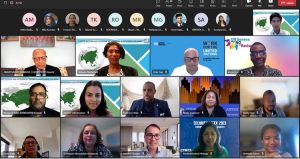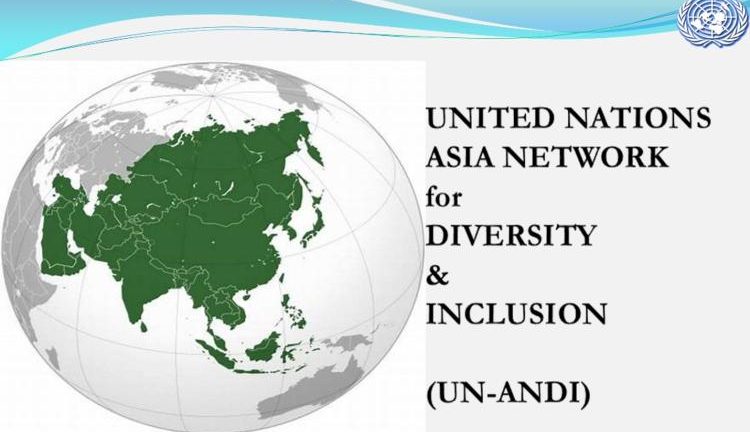By Shihana Mohamed*
NEW YORK | 2 March 2024 (IDN) — The UN Asia Network for Diversity & Inclusion (UN- ANDI) commemorated the 78th UN Day virtually on 27 October 2023 with a Panel Discussion on “Making the United Nations Charter a reality: focusing on the UN-ANDI Recommendations in the report of its survey on racism and racial discrimination” to eradicate racism in the UN system.
The event was attended by diverse participants from around the world, including UN-ANDI members, partners and friends who are fighting against racism in the UN system and personally committed to the values enshrined in the UN Charter, in particular, to “the right of everyone to enjoy all human rights and fundamental freedoms, without distinction as to race, sex, language or religion”.
UN-ANDI and the participants of the event observed a moment of silence to honour the memory of all the people, including our UN colleagues, who have lost their lives around the world because of racism, hate and violence.
The keynote address was delivered by the honorary member of UN-ANDI, Ambassador Anwarul Chowdhury, former Under-Secretary-General and High Representative of the UN, who highlighted the importance of the UN as the “indispensable common house of the entire human family” and revisited the Operational Credibility of the UN based on his fifty-one years of collaborative involvement with the UN.

The UN-AND’s UN Day message was delivered jointly by two of its youngest Coordinators (both are under 30 years old)—Mr. Yoshiharu Wakabayashi (UNIDIR) and Ms. Rashmi Subramanian (OHCHR). Yoshiharu, referencing former UN High Commissioner for Refugees Ms. Sadako Ogata, highlighted the importance of courage and self-awareness in making difficult decisions within the UN system, particularly against racial discrimination. He stressed that history shows great achievements often stem from acts of bravery, selflessness and self-awareness.
Rashmi, a young professional from South Asia, noted the challenges and barriers that someone from her background has to overcome to get into the UN, to have career progression and eventually to get promoted to senior-level positions while pointing out the UN-ANDI survey results on stagnant careers of Asian staff in the UN.
She emphasized the need to address disparities at all grade levels, from the recruitment stage onward, to achieve greater geographical representation and regional diversity as well as gender parity in the UN workforce.
The findings of the UN-ANDI survey on racism and racial discrimination in the UN system marked a significant milestone for UN-ANDI as being the first of its kind to highlight issues particularly faced by the Asian community in the UN system. UN-ANDI had the honor of sharing its work with UN Secretary-General António Guterres, senior management, staff unions, and its counterparts dedicated to combating racism within the UN system.
The key findings of the UN-ANDI survey on racism and racial discrimination in the UN system are:
- Nearly two-thirds expressed pride in being seen as Asian in the UN. However, a significant proportion (15 per cent) of respondents felt either uncomfortable to be seen as Asian or were afraid to be associated with being or to be identified as Asian.
- Three in every five respondents noted that they had experienced racism and bias, as well as the distress caused to them in terms of health, career and well-being. They also mentioned their lack of trust and confidence in the system, including existing recourse mechanisms.
- Stereotyping of people of Asian origin/descent was identified as the biggest problem faced, indicated by more than half of survey respondents.
- More than a third considered limited access to high-profile and visible assignments, career advancement, promotions, and learning and development opportunities as the biggest problem.
- Nearly a third identified being treated as invisible and not being seen or heard in the workplace as the biggest problem they faced.
- Nearly a third reported being affected by unfair and biased selection and recruitment processes and micro-aggression was indicated as problematic by 24 per cent.
- Seventeen per cent reported having suffered from biases, harassment, including sexual harassment, and discrimination.
- Alarmingly, 2 per cent indicated that they had faced physical assault or attacks (including intimidation and threats to use violence), while 13 per cent had faced verbal and/or emotional abuse in the workplace.
Based on its findings, UN-ANDI recommended several long-term measures in two main areas:
- To address issues related to various forms of racism in the UN organizational culture.
- To reverse the low level of staff representation from the Asia-Pacific region in the Professional & higher categories in the UN organizations, including at the decision-making levels.
Findings of the survey on racism
UN-ANDI believes that the findings of its survey on racism and racial discrimination and the recommendations are useful to all leaders and managers in the UN system organizations, staff federations, staff unions and staff as well as Member States and other stakeholders striving to create an organizational culture free from any form of discrimination, racism and biases.
From the Universal Declaration of Human Rights to the Durban Declaration and Programme of Action, throughout its existence of over 78 years, the UN stood firmly in its position against racism and racial discrimination around the world.
Indeed, article 1.3 of the UN Charter proclaims that actions against racism and racial discrimination are embedded in the ‘DNA’ of the UN. But it was not until relatively recently, that the UN turned its attention to racism and racial discrimination inwardly.
The survey conducted by UN-ANDI, consequently the panel discussion of its findings, and perhaps the very existence of UN-ANDI itself, are the stepwise products of the on-going broader self-reflective movement within the UN on its action against racism and racial discrimination.
Hence, UN-ANDI is not only an important partner of the ongoing change process, but also a vital component that contributes to the continuation or completion of the process of the UN’s efforts towards eradicating racism within itself.
*Shihana Mohamed, a founding member and one of the Coordinators of the United Nations Asia Network for Diversity and Inclusion (UN-ANDI) and a Public Voices Fellow with The OpEd Project and Equality Now on Advancing the Rights of Women and Girls, is a Sri Lankan national and Human Resources Policies Officer at the International Civil Service Commission. She prepared this article on behalf of the UN-ANDI.
UN-ANDI is a global network of like-minded Asians in the United Nations system who strive to promote a more diverse and inclusive culture and mindset within the UN system. UN-ANDI is the first-ever effort to bring together a diverse group of personnel (staff, retirees, consultants, interns, diplomats, and others) from Asia and the Pacific (nationality/origin/descent) in the UN system. To connect or/and collaborate with UN-ANDI, please contact via email at UnitedNationsAsiaNetwork@gmail.com. [IDN-InDepthNews]
Image source: UNtoday
IDN is the flagship agency of the Non-profit International Press Syndicate.


